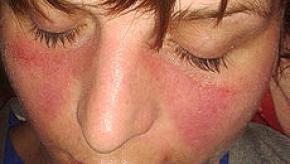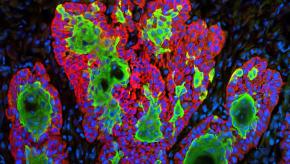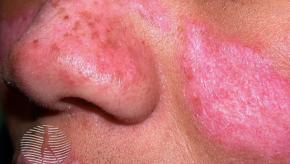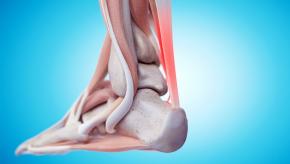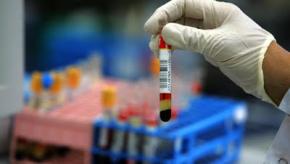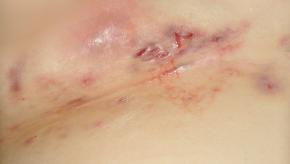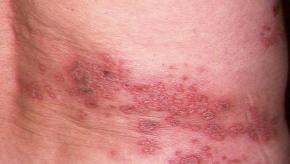All News
Does Biologic Treatment in Psoriasis Reduce the Risk of Psoriatic Arthritis?
Retrospective claims analysis shows that psoriasis patients treated with either an IL-12/23 inhibitor or an IL-23 inhibitor had a lower risk of developing incident psoriatic arthritis, compared to TNF inhibitors or IL-17 inhibitors.
Read ArticleLong-Term Benefit of Rituximab in Systemic Sclerosis
A small cohort trial of rituximab (RTX) in 29 systemic sclerosis patients showed significantly improved skin sclerosis and lung function after a follow-up of 96 weeks.
Read ArticleNSAIDs in Pregnancy (3.3.2023)
Dr. Jack Cush reviews the lastest journal articles, news, and FDA announcements from the past week on RheumNow. This week, the importance of IFNa, Subclinical PsA and NSAID safety during Pregnancy.
Read ArticleVEGA - The Efficacy of Combination Biologics in Ulcerative Colitis
A novel trial has shown that combination biologic therapy (guselkumab plus golimumab) to be more effective in ulcerative colitis than either biologic alone.
Read ArticleSarilumab is FDA Approved for PMR
Yesterday, the U.S. Food and Drug Administration (FDA) approved sarilumab (Kevzara) for the treatment of adults with active, refractory polymyalgia rheumatica (PMR), stipulating it is indicated in those patients who have had an inadequate response to corticosteroids or who cannot tolerate corticosteroid taper.
Read ArticleTreat-to-Target Guidelines for GCA and PMR
The Annals of Rheumatic Disease has published updated multinational, treat-to-target (T2T) recommendations for the treatment of giant cell arteritis (GCA) and polymyalgia rheumatica (PMR).
Read ArticlePhase 3 Trials of Baricitinib Disappoint in SLE
Despite the encouraging phase II trial results of baricitinib in systemic lupus erythematosus (SLE) patients, two parallel phase III trials have failed to redemonstrate the efficacy of baricitinib in active SLE, thereby halting development of baricitinib in SLE.
Read ArticleNew Drug Formulations – For Patients or Profits?
Wang et al., in a JAMA Network Research Letter, recently reviewed Medicaid expenditures on adalimumab (ADA), sold under the brand name HUMIRA®. They noted that the introduction of the citrate-free formulation cost an extra $4.4B to Medicaid between 2014 and 2021.
Read ArticleDrug Safety Differences with New Novel Therapies in RA
Safety outcomes for targeted synthetic or biological disease-modifying antirheumatic drugs (b/ts DMARDs) used to treat RA were studied using data from the Anti-Rheumatic Therapies in Sweden (ARTIS) registry, showing that these newer agents are largely similar, but still have particular differences for specific infection or other adverse event risks.
Read ArticleOlder Lupus Patients Need Follow-Up After Hospital Discharge
Medicare beneficiaries 65 and older with lupus faced dramatically higher mortality when they received no follow-up care during the month after a hospital stay, researchers found.
Read ArticleDoes Methotrexate Increase Skin Cancer Risk?
There are several reports suggesting a link between methotrexate (MTX) use and certain skin cancers, yet these are confounded by a higher risk of skin cancers with inflammatory conditions like rheumatoid arthritis of which MTX is the most common treatment.
Read ArticleDeucravacitinib - Effective in Systemic Lupus Erythematosus
A Phase II, multicenter study has demonstrated the efficacy and safety of deucravacitinib, an oral, selective, allosteric inhibitor of TYK2, in adults with active systemic lupus erythematosus (SLE).
Read ArticleSerious Infection Risk in Pediatric Psoriasis with Ustekinumab, Etanercept, or Methotrexate
Etanercept was FDA approved for use in pediatric psoriasis (PsO) in 2016 and ustekinumab was similarly approved in 2020. This comparative analysis looks at the risk of serious infections (SIE) requiring hospitalization in pediatric PSO patients treated with ustekinumab, etanercept, or
Read ArticleGRAPPA Recommendations for Treating Enthesitis in Psoriatic Arthritis
GRAPPA has provided new, evidence based updates to the management of enthesitis in patients with psoriatic arthritis (PsA), affecting at least 30% of PsA patients and is associated with more severe disease, x-ray damage, and poorer outcomes.
Read ArticleICYMI: GRAPPA Recommendations for Treating Enthesitis in Psoriatic Arthritis
GRAPPA has provided new, evidence based updates to the management of enthesitis in patients with psoriatic arthritis (PsA), affecting at least 30% of PsA patients and is associated with more severe disease, x-ray damage, and poorer outcomes.
Read ArticleNovel Proteomic Biomarker Set in Osteoarthritis
NIH funded researchers from Duke University have developed a set of serum proteomic biomarkers that successfully predict clinically relevant knee osteoarthritis (KOA) progression (both structural change and joint pain) over a 2 year period.
Read ArticleACR Urges CMS to Reconsider Copay Assistant Programs in CMS Proposed Rule
The Health and Human Services Notice of Benefit and Payment Parameters proposed rule for 2024 does not revise policies related to copay assistance and patient deductibles.
Read ArticleHope for Biologic Treatment of Hidradenitis Suppurativa
A meta-analysis of trials using biologics [adalimumab (ADA), ustekinumab (UST) and secukinumab (SEC)] in the the management of hidradenitis suppurativa (HS) suggests promising results, but more controlled, rigorous studies are needed.
Read ArticleHerpes Zoster with JAK Inhibitors
JAK inhibitors are approved for several immune-mediated inflammatory diseases and carry a higher than usual risk of herpes zoster in certain conditions like rheumatoid arthritis, psoriatic arthritis, ankylosing spondylitis and ulcerative colitis.
Read Article







